re:View – The 2011 bookshelf I
I like lists. I like to keep track of things. I hate it when somebody asks me which books I have read recently, and I know that there are some great titles somewhere at the back of my mind that I could shout out – but when I try to remember the author’s names, the covers, stories and characters, my fuzzy brain mashes everything up into a big blob of literary goo while I try to get hold of any one title that I could pull out of the mess.
Therefore I have embarked upon the attempt to remember all the books I’ve read this year and write down a few thoughts about them. Just to keep everything neat and organised. Of course this is only part one becuase there’s a whole lot of year left, and I have got a load of books on my wish list for the second half of 2011.
Auntie Mame: An Irreverent Escapade
by Patrick Dennis | amazon (UK)
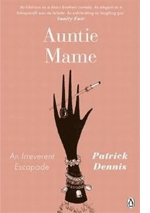 My little darling! Auntie Mame is one of the most dazzling characters I’ve ever come across in literature. Spreading her charms at the centre of this fictional memoir of a boy raised by his rich, eccentric aunt in 1920s New York, Mame is a socialite slightly ahead of her time, who turns her nephew’s life into a mad fairground ride with one outrageous adventure chasing the next.
My little darling! Auntie Mame is one of the most dazzling characters I’ve ever come across in literature. Spreading her charms at the centre of this fictional memoir of a boy raised by his rich, eccentric aunt in 1920s New York, Mame is a socialite slightly ahead of her time, who turns her nephew’s life into a mad fairground ride with one outrageous adventure chasing the next.
Told in the author’s sarcastic, down-to-earth voice, Mame’s airy, naively radical ideas and attitudes turn into comedy of the finest kind. But Dennis’ very detailed observations of the fashion, the mindsets and the manners of the time add a distinct shine to the slapstick, sweeping you up in a sensation of the glamour and luxury of an era that you’ll find yourself struggling to step out of again. This book is an exquisite treat – it’s that feeling of eating a whole box of fancy chocolates that you know you can’t afford.
Read it? Yes, yes, yes!
Around the World with Auntie Mame
by Patrick Dennis | amazon (UK)
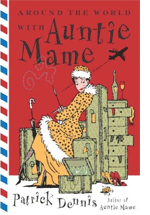 Auntie Mame is back, and she’s ready to get scandalous. In the second volume of Patrick Dennis’ fictional memoir of a boy growing up with his super rich, super elegant, super crazy aunt, the narrator reminisces about his travels with Mame during the 1930s. From Europe to Communist Russia (a brilliantly satirical chapter that was censored from the original 1950s release for being too risky), to the Middle East, Mame travels on a trail of scandalous social engagements, disastrous romance and neck-breaking adventures.
Auntie Mame is back, and she’s ready to get scandalous. In the second volume of Patrick Dennis’ fictional memoir of a boy growing up with his super rich, super elegant, super crazy aunt, the narrator reminisces about his travels with Mame during the 1930s. From Europe to Communist Russia (a brilliantly satirical chapter that was censored from the original 1950s release for being too risky), to the Middle East, Mame travels on a trail of scandalous social engagements, disastrous romance and neck-breaking adventures.
I highly recommend reading both books in sequence. The second volume benefits greatly from all the scenery and characters that have already been established so vividly in the first book, while at the same time adding new dimensions in the form of different cultural playing fields as well as a more mature and critical voice of a narrator now in his early twenties. By the time you have finished reading the second book, you’ll be completely in love with Mame and her world.
Read it? Absolutely.
Winterkartoffelknödel
by Rita Falk | amazon (DE)
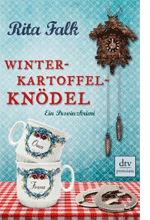 One for the German(-speaking) readers. I don’t normally read murder mysteries, but this one was given to me as a present by a friend from home. It’s a sort of comedy murder mystery set in and around my hometown in lower Bavaria. Now, this isn’t exactly high literature, or even a particularly clever murder mystery. But what I found brilliant about this book is how closely it portrays the particular language and way of life in a very small area of the country. And I’m not talking about the culture and language of Bavaria as a region. This book gives you the very detailed quirks of the Bavarian dialect and the culture of just one town and a few surrounding villages – the kind of stuff that is so regional and specific that it won’t even apply to the next town 50km down the motorway. You probably need to be from the area to fully enjoy the authenticity of the writing and all the references. To me every single character in this story was real, as if taken directly out of my street at home. But if you’re not from the area, you’ll probably still roll around laughing, because this ‘provincial thriller’, as it calls itself, is one of the finest examples of micro-cultural comedy I’ve come across in a long time.
One for the German(-speaking) readers. I don’t normally read murder mysteries, but this one was given to me as a present by a friend from home. It’s a sort of comedy murder mystery set in and around my hometown in lower Bavaria. Now, this isn’t exactly high literature, or even a particularly clever murder mystery. But what I found brilliant about this book is how closely it portrays the particular language and way of life in a very small area of the country. And I’m not talking about the culture and language of Bavaria as a region. This book gives you the very detailed quirks of the Bavarian dialect and the culture of just one town and a few surrounding villages – the kind of stuff that is so regional and specific that it won’t even apply to the next town 50km down the motorway. You probably need to be from the area to fully enjoy the authenticity of the writing and all the references. To me every single character in this story was real, as if taken directly out of my street at home. But if you’re not from the area, you’ll probably still roll around laughing, because this ‘provincial thriller’, as it calls itself, is one of the finest examples of micro-cultural comedy I’ve come across in a long time.
Read it? If your Bavarian is good enough to handle it!
You Suck
by Christopher Moore | amazon (UK)
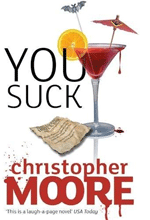 Let me get one thing out of the way first: I am a bit of a Christopher Moore fangirl. He’s great for quick, effortless entertainment and big laughs. A lot of his humour is based on observations of identities – how we construct them as well as how they are perceived – and he never seems to run out of imaginative, weird and immensely funny language. Most of all, I love that all his characters are normal everyday people, yet they all have their obsessions, their quirks, their secrets and their little sparks of madness, which makes them very authentic and can also be quite reassuring if you tend to feel like you’re the weird one in your world.
Let me get one thing out of the way first: I am a bit of a Christopher Moore fangirl. He’s great for quick, effortless entertainment and big laughs. A lot of his humour is based on observations of identities – how we construct them as well as how they are perceived – and he never seems to run out of imaginative, weird and immensely funny language. Most of all, I love that all his characters are normal everyday people, yet they all have their obsessions, their quirks, their secrets and their little sparks of madness, which makes them very authentic and can also be quite reassuring if you tend to feel like you’re the weird one in your world.
You Suck is the second part of the love story series telling the (after)life story of Jody, newly-turned vampire, and her minion / lover Tommy, as they try to figure out how to live like proper creatures of the night in Moore’s lively San Francisco universe. The second part of the story introduces a host of new characters, most notably teen goth-punk-emo girl Abbey, who is desperate to become a vampire, writes the most hilariously tormented diary entries ever published, and is responsible for most of the laughs. Naturally the book also features the various assorted components of a good vampire story, including the cops with stakes, the evil über-vampire, the geeky scientist… oh, and a giant shaved vampire cat.
Read it? If you’re sick of the sappy vampire romance franchise and missing the times when vampire stories were crazy and fun, this is your book!
Bite Me
by Christopher Moore | amazon (UK)
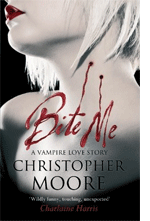 More of Moore’s love story series. This final part wraps up the storyline of vampires Jody and Tommy, their minions, friends and enemies. The story has a bit of the “tying up loose ends” feel to it and isn’t quite as rich and exciting as the first two parts. But if you’ve read the whole series, this one feels like spending a bit more time with old friends. And while Jody, Tommy, Abby & co face their final battles that will decide which on which side of the darkness they’ll spend their lives, the San Francisco universe Moore has created over the years comes alive more than ever. And of course it’s all still good fun, action-packed slapstick, and the usual witty banter.
More of Moore’s love story series. This final part wraps up the storyline of vampires Jody and Tommy, their minions, friends and enemies. The story has a bit of the “tying up loose ends” feel to it and isn’t quite as rich and exciting as the first two parts. But if you’ve read the whole series, this one feels like spending a bit more time with old friends. And while Jody, Tommy, Abby & co face their final battles that will decide which on which side of the darkness they’ll spend their lives, the San Francisco universe Moore has created over the years comes alive more than ever. And of course it’s all still good fun, action-packed slapstick, and the usual witty banter.
[It gets a big minus for the shit cover though. What a disgrace that, after all the great, ironic cover designs of Moore’s previous books, they decided to go with the effing Twilight/True Blood crap for this one. Booh.]
Read it? It’s probably only worth it if you’ve read at least one of the previous volumes.
Good Omens
by Terry Pratchett and Neil Gaiman | amazon (UK)
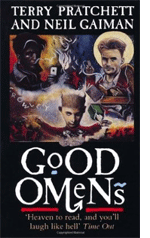 According to the Nice and Accurate Prophecies of Agnes Nutter – the world’s only totally reliable guide to the future – the world will end on a Saturday. Next Saturday, in fact. Just after tea…
According to the Nice and Accurate Prophecies of Agnes Nutter – the world’s only totally reliable guide to the future – the world will end on a Saturday. Next Saturday, in fact. Just after tea…
Forget everything you thought you knew about the Armageddon, and prepare to be taken for an apocalyptic ride. And prepare to be laughing hard.
I had never read Pratchett (or Gaiman) and I mostly read Good Omens because The Boyfriend strongly recommended it. (And partly because I do love a good funny turn on Christian religious material of any kind.) This is probably the kind of book I have to read two or three times to get a chance to enjoy everything that’s in there.* The amount of imagination, clever twists of the familiar, and hilarious unexpected comments quite overwhelming – in the best possible way. Every paragraph of this book is so packed with details, observations and new interpretations of what you thought you knew, that it does require a fair bit of attention to get the most out of it. But the genius lies in the little details, as do the laughs (and there are plenty), so the extra minute spend on a page, or even a footnote, will be massively rewarding. One of my new favourite books of all times.
Read it? YES! If you read one book this year, this is it!
*The footnotes alone probably deserve a full read.
The Truth
by Terry Pratchett | amazon (UK)
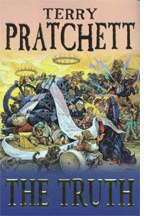 This is the first Discworld novel I’ve read, so I can’t really rate it in the context of the overall saga. But I don’t have to be the hundred millionth person to tell you that Pratchett is an absolute genius, because that’s a fact and everybody knows it. The Truth wasn’t necessarily the book that made me fall in love with Pratchett’s writing, but nevertheless this story about the birth of printed news and the first newspaper in Discworld has been an absolutely delightful read.
This is the first Discworld novel I’ve read, so I can’t really rate it in the context of the overall saga. But I don’t have to be the hundred millionth person to tell you that Pratchett is an absolute genius, because that’s a fact and everybody knows it. The Truth wasn’t necessarily the book that made me fall in love with Pratchett’s writing, but nevertheless this story about the birth of printed news and the first newspaper in Discworld has been an absolutely delightful read.
If you come from a publishing background (as I happen to) and have studied journalism to the point where each story, each headline, each word gets deconstructed, rewritten, subbed, and rewritten again, you will most certainly find yourself in very familiar company on pretty much every page of this book. With great insight, surprising detail and a good deal of topical humour, Pratchett exposes the true nature of publishing with all its brilliance and weaknesses. This should be compulsory reading for any student of journalism across the country!
Read it? If you have anything to do with journalism, publishing or the media, or if you just like to keep up with the news in general, I bet you’ll love it.
Practical Demonkeeping
by Christopher Moore | amazon (UK)
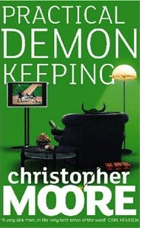 When I decided to read Christopher Moore’s first book, I somehow expected it to be his funniest. You know, something fresh and original, created before the new author gets sucked into the commercial publishing machine and starts churning out mass-manufactured replica of his first success.
When I decided to read Christopher Moore’s first book, I somehow expected it to be his funniest. You know, something fresh and original, created before the new author gets sucked into the commercial publishing machine and starts churning out mass-manufactured replica of his first success.
But compared to Moore’s later books, Practical Demonkeeping seems to lack maturity and courage – it feels as if the author was testing the waters that he would fully plunge into only later in his career. His greatest skill – the clever observation of personalities and identities – already comes through here: The delicate portrait of an array of weird yet familiar characters in the sleepy coastal town of Pine Cove, California, is the real attraction in this book. The actual story – an ancient demon that spent the millennia getting summoned, wreaking havoc, and getting banned again currently happens to be on the loose in Pine Cove – is mostly secondary. The demon, although quite dangerous and rather chatty, is neither scary nor funny, but mostly a general annoyance that keeps getting in the way of the entertaining little storylines of the various minor (but much more exciting) characters. Not the greatest Moore of all times. In fact, probably the weakest Moore I’ve read.
Read it? Skip this one and go for one of his later books.
Lamb: The Gospel According to Biff, Christ’s Childhood Pal
by Christopher Moore | amazon (UK)
 Probably the Moore novel I had the highest expectations for: The New Testament, re-told by the master of modern literary pisstaking. But Lamb was probably the unfunniest Moore I’ve ever read, and it wasn’t anywhere near half as funny as the average Bible parody. The ratio of the fun bits to the massive volume of (largely unnecessary and pointless) storyline didn’t really work in entertainment’s favour. Starts promising, becomes tedious quickly, ends on a bit of an anticlimax. However, if you enjoy random appearances of monsters, Chinese concubines, Kung Fu monks and the Yeti – and are now wondering what the hell they have to do with the Messiah’s life story – you might find yourself mildly amused by this book.
Probably the Moore novel I had the highest expectations for: The New Testament, re-told by the master of modern literary pisstaking. But Lamb was probably the unfunniest Moore I’ve ever read, and it wasn’t anywhere near half as funny as the average Bible parody. The ratio of the fun bits to the massive volume of (largely unnecessary and pointless) storyline didn’t really work in entertainment’s favour. Starts promising, becomes tedious quickly, ends on a bit of an anticlimax. However, if you enjoy random appearances of monsters, Chinese concubines, Kung Fu monks and the Yeti – and are now wondering what the hell they have to do with the Messiah’s life story – you might find yourself mildly amused by this book.
Read it? Don’t bother.
The Lust Lizard of Melancholy Cove
by Christopher Moore | amazon (UK)
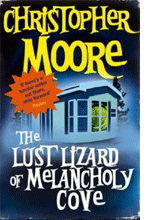 Moore returns to the scene of his first hit: the coastal small town of Pine Cove, California, filled with weirdos, hippies, and the occasional nutter. This time, the town is in slightly more distress than usual – mostly because the town psychiatrist has decided to take some twelve hundred patients off their antidepressants; and partly because an ancient 50-feet sea monster has decided to stop by for a while.
Moore returns to the scene of his first hit: the coastal small town of Pine Cove, California, filled with weirdos, hippies, and the occasional nutter. This time, the town is in slightly more distress than usual – mostly because the town psychiatrist has decided to take some twelve hundred patients off their antidepressants; and partly because an ancient 50-feet sea monster has decided to stop by for a while.
It doesn’t improve matters that the sea monster, Steve, has the pre-evolutionary ability to cause everyone to become a bit, er…hormonal, likes to mate with explosive objects, and has taken to snacking on the unsuspecting inhabitants. In the end it’s down to the pothead town constable, Kendra the (retired) Warrior Queen of the Outland, a sea mammal-o-phile and a blues man to save the Pine Covers from becoming fish food. Lust Lizard is probably my favourite Moor novel outside of the San Francisco universe. His second take on the Pine Cove universe is a lot bolder, and a lot more fun than his debut novel Practical Demonkeeping. The characters are delightfully crazy, the storyline makes sense (as far as thousands-of-years-old sea monsters go) and the whole thing is just one big, exciting, ridiculous adventure.
Read it? It’s a must if you enjoy a random comedy trip into weirdo-land!
The Curious Incident of the Dog in the Night-Time
by Mark Haddon | amazon (UK)
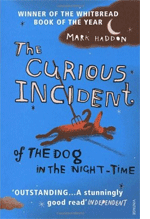 Certainly not quite your average book for young readers, or any readers, The Curious Incident has left me a bit divided. The idea of a murder mystery-slash-family drama told from the perspective of a teenager with Asperger’s Syndrome is definitely intriguing. I can’t say I massively enjoyed the book, though. But at the same time I thought it was pretty good and cleverly done. The weird thing about this book is that it didn’t move me – in a strangely moving way. The dramatic story is there, but it just doesn’t grip you. But that’s the whole point of this book, I suppose, seeing as the author is trying to make us understand the perspective of someone affected by Asperger’s. And from what I’ve heard reviewers say, he is doing so quite well. So, technically, it is a really good book, and it is an interesting read. Maybe my problem with it is just that I like books to draw me in and touch me, make me love and hate the characters… – and this is just not the kind of book to do that kind of thing.
Certainly not quite your average book for young readers, or any readers, The Curious Incident has left me a bit divided. The idea of a murder mystery-slash-family drama told from the perspective of a teenager with Asperger’s Syndrome is definitely intriguing. I can’t say I massively enjoyed the book, though. But at the same time I thought it was pretty good and cleverly done. The weird thing about this book is that it didn’t move me – in a strangely moving way. The dramatic story is there, but it just doesn’t grip you. But that’s the whole point of this book, I suppose, seeing as the author is trying to make us understand the perspective of someone affected by Asperger’s. And from what I’ve heard reviewers say, he is doing so quite well. So, technically, it is a really good book, and it is an interesting read. Maybe my problem with it is just that I like books to draw me in and touch me, make me love and hate the characters… – and this is just not the kind of book to do that kind of thing.
Read it? Yes? No? Well… It’s a quick read, and it is quite unusual. So probably worth a try.
Bitte ein Brit: Neue Abenteuer auf der Insel
by Wolfgang Koydl | amazon (DE)
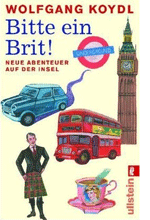 A foreign correspondent for a major national German newspaper, who has lived in England for many years, Wolfgang Koydl is in a prime position to comment on what it’s like to be a German living among the British. This is his second book on the subject, and while it feels a bit like a slightly less bothered copy of the first one, it still does a very good job at providing insights into the British lifestyle and hilarious observations of a culture from the perspective of a very different culture.
A foreign correspondent for a major national German newspaper, who has lived in England for many years, Wolfgang Koydl is in a prime position to comment on what it’s like to be a German living among the British. This is his second book on the subject, and while it feels a bit like a slightly less bothered copy of the first one, it still does a very good job at providing insights into the British lifestyle and hilarious observations of a culture from the perspective of a very different culture.
Koydl’s language is delightful – unexpected, inventive, self-conscious, and very, very funny. He cleverly mixes colloquial language with a very high-standard, almost scientific tone reminiscent of a scientist writing down observations of a new species for a research journal. Which kind of leaves you with a hilarious manual on how to make sense of, and survive, in a culture that is as wonderful as it is weird. All the same is true for the first book, Fish and Fritz, which is similar in style but definitely has the bigger stories and the much bigger laughs.
Read it? If you’re German and don’t know much about Britain, these two books are your perfect introduction. If you’re German and have been to Britain, they will make you chuckle and explain a lot of things. If you’re German and live in Britain, you will find in them your essential companion, your ally, the secret island of sanity in the back of your mind that will see you through and tell you that it’s okay to be German!
The Wee Free Men
by Terry Pratchett | amazon (UK)
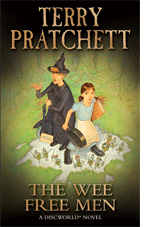 Ach crivens! Not the first Pratchett I’ve read, but this first part of the Tiffany Aching series made me fall in love with his writing. This is pure magic in a book. How one single human being can have such a load of imagination, humour, observational skills and eye for detail as Pratchett is a mystery to me. Everything in The Wee Free Men is alive – not just the characters, but the very land they walk on.
Ach crivens! Not the first Pratchett I’ve read, but this first part of the Tiffany Aching series made me fall in love with his writing. This is pure magic in a book. How one single human being can have such a load of imagination, humour, observational skills and eye for detail as Pratchett is a mystery to me. Everything in The Wee Free Men is alive – not just the characters, but the very land they walk on.
Initially I was a bit disappointed to find that the story was a version of the Snow Queen fairytale. But Pratchett gives it his own twist with this Discworld makeover, and soon you’re so enchanted and fascinated by the world of the Nac Mac Feegle that it doesn’t really matter if the villain appears a bit old and faded. Young witch Tiffany is a great, great heroine for a modern fairy tale – brave and strong, wise and funny, and with just enough edges to keep her real. And the Nac Mac Feegle are a wonderfully Pratchettian turn on the usual fairytale folk: they drink, they swear, they steal, they fight and brawl like a pub at closing time – in short, they couldn’t be further from the fluffy, sparkly, pretty ballerina fairy image that Disney, Mattel & co have used to efficiently to ruin the street cred of the fair folks in our times.
Read it? It’s a book for young readers, but you certainly don’t have to be a child to get drawn into this delightful world of magic. Read it. And then read the sequel!
A Hat Full of Sky
by Terry Pratchett | amazon (UK)
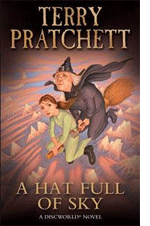 The sequel to The Wee Free Men sees young witch Tiffany leave her home turf to go into witchcraft apprenticeship. As any young heroine who starts to become aware of her powers, Tiffany gets herself into a whole lot of trouble. But the Nac Mac Feegle are on a mission to help her out, and master witch Granny Weatherwax – one of the most captivating characters of Discworld – takes Tiffany under her wing.
The sequel to The Wee Free Men sees young witch Tiffany leave her home turf to go into witchcraft apprenticeship. As any young heroine who starts to become aware of her powers, Tiffany gets herself into a whole lot of trouble. But the Nac Mac Feegle are on a mission to help her out, and master witch Granny Weatherwax – one of the most captivating characters of Discworld – takes Tiffany under her wing.
A Hat Full of Sky continues much in the same tradition as The Wee Free Men, but it’s a bit darker and a bit more grown up. While the first volume saw Tiffany storming into fairyland and battling the evil queen, this time the young witch has to face her own demons – that streak of evil that’s lurking somewhere in the shades of the human heart – and come to terms with her identity. It’s probably the equivalent to the teenage angst that so much of YA fiction is obsessed with these days, except that this teenager’s angst is served Pratchett style, with an army of rude little pictsies tumbling all over it, and a whole lot of other magical chaos on the side.
Read it? Yes. It’s funny, it’s moving, and it reminds you that you’re never too old to believe in magic.
Dampfnudelblues
by Rita Falk | amazon (DE)
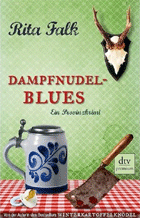 Sequel to Winterkartoffelkndödel (see above) and more of the same. In this case, however, this means more of the same fine provincial murder mystery comedy that has already offered such a delightful micro-cultural experience in the first book. The mystery side of this episode is probably even weaker than the first one – the murder case our village constable has to solve this time is pretty much secondary. But it works well enough as a background canvas on which the author draws up a pretty damn real image of the village and the people, their culture, their food, and – most importantly – their language. Sharply observed and authentically reproduced, the very particular regional dialect of one town comes alive with all its unique idioms and colloquialisms, its, er… imaginative interpretation of grammar, and its often crudely poetic adaptation of the German language. It doesn’t feel like home, it is home.
Sequel to Winterkartoffelkndödel (see above) and more of the same. In this case, however, this means more of the same fine provincial murder mystery comedy that has already offered such a delightful micro-cultural experience in the first book. The mystery side of this episode is probably even weaker than the first one – the murder case our village constable has to solve this time is pretty much secondary. But it works well enough as a background canvas on which the author draws up a pretty damn real image of the village and the people, their culture, their food, and – most importantly – their language. Sharply observed and authentically reproduced, the very particular regional dialect of one town comes alive with all its unique idioms and colloquialisms, its, er… imaginative interpretation of grammar, and its often crudely poetic adaptation of the German language. It doesn’t feel like home, it is home.
Read it? You probably need to be a native speaker (or pretty close) to really enjoy it.
